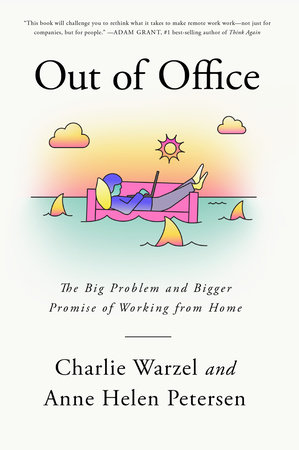Book Review: Out of Office, by Charlie Warzel and Anne Helen Petersen
Lauren Hays
When I first heard about the book Out of Office by Charlie Warzel and Anne Helen Petersen I knew it was a book I needed to read.

As I have mentioned in previous posts, I started working primarily from home before the pandemic, but of course, the pandemic intensified that work, and accelerated the move to being more fully out of the office. While I have started working more in an office over the last few months, I suspect working from home will be part of my life for the foreseeable future. Therefore, it was important to me to understand how others are processing working out of the office and what impact this type of work was/is having on all of us.
Warzel and Petersen both started working from home many years ago and had to learn how to create a life that worked for them. In the book, they share their own stories and discuss the extensive research they have conducted about creating a life that is not consumed by work. At the end of the introduction, the authors are clear “we’re loath to say it out loud, but our actions tell the true story: we value our work performance over our families, over personal growth and health, and over our communities” (p. 16). The purpose of this book is to help us all rethink the place work holds in our lives that is easily exacerbated by the ability to work from home.
One key item to note about this book is that while it is focused on remote work it actually addresses many aspects of “knowledge work” (i.e. the ability to work anywhere and anytime). Readers who are primarily working in an office will also resonate with many of the topics if they find themselves checking their email after they leave the office, have close friends at their place of employment, or find that they have trouble turning off work-related technology.
In the book, Warzel and Petersen focus on four areas: flexibility, culture, technologies in the office, and community. Each of these areas is an important consideration for knowledge workers, and the authors do a good job explaining how each one can create both positive and negative impacts for workers. For me, the section on flexibility resonated most closely with my own experiences; however, all four sections are important to read.
In my opinion, what this book does so well is addressing the problem of overwork and helping us think through ways to re-center our lives so that work does not creep into every corner. This is a book I highly recommend, and hope many of you find it beneficial as well.
Lauren Hays
Lauren Hays, PhD, is an Assistant Professor of Instructional Technology at the University of Central Missouri, and a frequent speaker on topics related to libraries and librarianship. Her professional interests include information literacy, educational technology, library and information science education, teacher identity, and academic development. Please read Lauren’s other posts about skills for special librarians. And take a look at Lucidea’s powerful integrated library systems, SydneyEnterprise, and GeniePlus, used daily by innovative special librarians in libraries of all types, sizes and budgets
Never miss another post. Subscribe today!
Similar Posts
Teaching about AI in the Workplace
Suggestions for special librarians from Claude on how to foster cross-generational AI learning communities in the workplace.
Keeping up with AI…
Resources for staying current on the quickly changing AI landscape from a library expert.
Interview with Lesley Farmer about SLA’s Information Outlook
Interview about the rebirth of SLA’s Information Outlook as a quarterly online publication with interview with Professor Lesley Farmer
Ways I Have Been Using Generative AI
Generative AI can be used in many ways as part of a typical workflow; examples and thoughts about what the future holds




Leave a Comment
Comments are reviewed and must adhere to our comments policy.
0 Comments